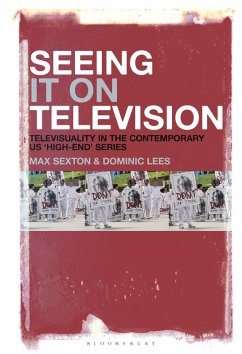Seeing It on Television: Televisuality in the Contemporary US 'High-end' Series investigates new categories of high-end drama and explores the appeal of programmes from Netflix, Sky Atlantic/HBO, National Geographic, FX and Cinemax. An investigation of contemporary US Televisuality provides insight into the appeal of upscale programming beyond facts about its budget, high production values and/or feature cinematography. Rather, this book focuses on how the construction of meaning often relies on cultural discourse, production histories, as well as on tone, texture or performance, which establishes the locus of engagement and value within the series.
Max Sexton and Dominic Lees discuss how complex production histories lie behind the rise of the US high-end series, a form that reflects industrial changes and the renegotiation of formal strategies. They reveal how the involvement of many different people in the production process, based on new relationships of creative authority, complicates our understanding of 'original content'. This affects the construction of stylistics and the viewing strategies required by different shows. The cultural, as well as industrial, strategies of recent television drama are explored in The Young Pope, The Knick, Stranger Things, Mars, Fargo, The Leftovers, Boardwalk Empire, and Vinyl.
Max Sexton and Dominic Lees discuss how complex production histories lie behind the rise of the US high-end series, a form that reflects industrial changes and the renegotiation of formal strategies. They reveal how the involvement of many different people in the production process, based on new relationships of creative authority, complicates our understanding of 'original content'. This affects the construction of stylistics and the viewing strategies required by different shows. The cultural, as well as industrial, strategies of recent television drama are explored in The Young Pope, The Knick, Stranger Things, Mars, Fargo, The Leftovers, Boardwalk Empire, and Vinyl.









